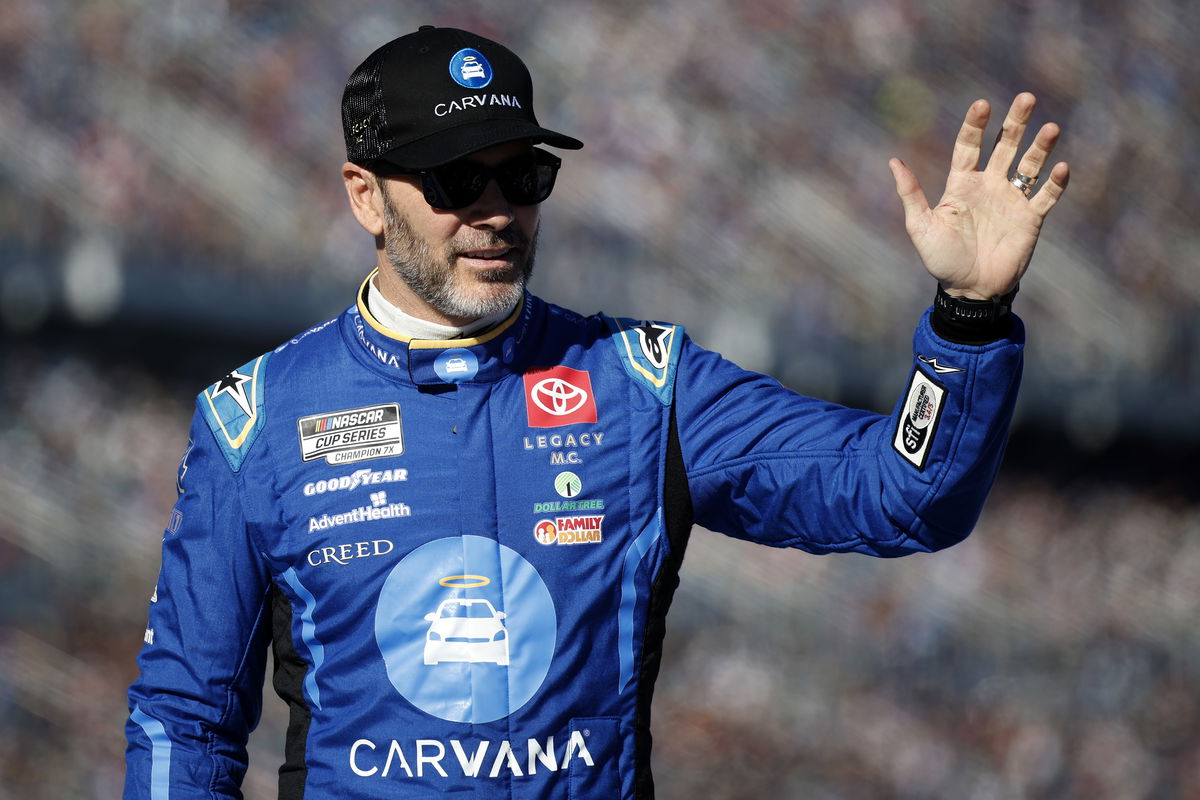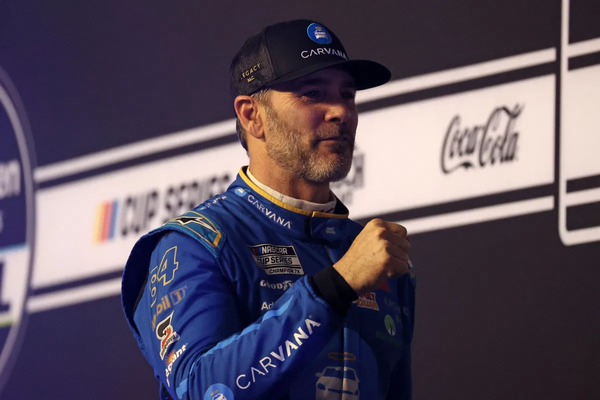
Getty
DAYTONA BEACH, FLORIDA – FEBRUARY 19: Jimmie Johnson, driver of the #84 Carvana Toyota, waves to fans as he walks onstage during driver intros prior to the NASCAR Cup Series Daytona 500 at Daytona International Speedway on February 19, 2024 in Daytona Beach, Florida. (Photo by Chris Graythen/Getty Images)

Getty
DAYTONA BEACH, FLORIDA – FEBRUARY 19: Jimmie Johnson, driver of the #84 Carvana Toyota, waves to fans as he walks onstage during driver intros prior to the NASCAR Cup Series Daytona 500 at Daytona International Speedway on February 19, 2024 in Daytona Beach, Florida. (Photo by Chris Graythen/Getty Images)

Getty
DAYTONA BEACH, FLORIDA – FEBRUARY 19: Jimmie Johnson, driver of the #84 Carvana Toyota, waves to fans as he walks onstage during driver intros prior to the NASCAR Cup Series Daytona 500 at Daytona International Speedway on February 19, 2024 in Daytona Beach, Florida. (Photo by Chris Graythen/Getty Images)

Getty
DAYTONA BEACH, FLORIDA – FEBRUARY 19: Jimmie Johnson, driver of the #84 Carvana Toyota, waves to fans as he walks onstage during driver intros prior to the NASCAR Cup Series Daytona 500 at Daytona International Speedway on February 19, 2024 in Daytona Beach, Florida. (Photo by Chris Graythen/Getty Images)
Jimmie Johnson, a seven-time Cup champion with 83 wins, spent over two decades at the top of NASCAR. Before retiring in 2020, he described the relentless 38-week grind as exhausting and isolating. This was a commitment that pulled him away from family and left little room for other passions. His announcement carried the tone of a man ready to pivot. And now, he recently spoke about just how difficult life in NASCAR had become, forcing an exit.
Watch What’s Trending Now!
Since stepping away, Jimmie Johnson has dabbled in IndyCar, sports cars. He even assumed team ownership responsibilities with Legacy Motor Club. Each move reflected a deliberate shift from the rigid structure of his NASCAR years. Slowly, he shifted to a career on his own terms. Yet the motivations behind his decision to leave stock car racing full-time have remained somewhat opaque.
Meanwhile, fans speculated about age, performance, or even financial factors. However, Johnson only recently revealed the deeper reasons. His candid reflections provide an entirely new dimension to his exit.
Jimmie Johnson’s fear-driven NASCAR reality
Speaking with Kevin Harvick, Johnson admitted that fear was his primary motivator throughout his NASCAR career. “Everything in my career has been driven by fear,” he said. He described the anxiety of failure, unemployment, and the constant need to perform.
He explained that this mindset fueled his accomplishments, leaving him in an unhealthy headspace. “I didn’t like who I was becoming or the way my headspace was during the course of a season,” Johnson confessed. It was a striking admission from one of NASCAR’s most successful drivers. He acknowledged that his celebrated dominance came at the expense of his mental well-being.
Johnson revealed that fatherhood was the turning point. The responsibilities of raising two daughters forced him to confront how unsustainable his fear-driven lifestyle had become.
“Having kids really helped me realize that I wasn’t handling things right, that my mindset wasn’t healthy,” he said. When he transitioned to IndyCar, the motivation shifted entirely. It was no longer about survival, but about joy. “I felt like my fear meter was broken, I didn’t care anymore, and wasn’t driven by fear. I wanted to enjoy it and embrace the opportunity.” What Harvick framed as flipping a switch was, in truth, Johnson reclaiming a sense of purpose beyond fear. This was a confession that reshapes how people view his NASCAR exit.

The future for Johnson now blends part-time racing with his growing role as a team owner. Legacy Motor Club has been restructuring since his arrival. Johnson’s hands-on involvement has found a new balance between competition and family life. For NASCAR, the takeaway is clear.
Even its most decorated champions are not immune to the mental toll. Johnson’s confession suggests that future decisions may increasingly weigh mental health alongside performance.
Johnson clinging to his time after London return
Since relocating back to the U.S., Jimmie Johnson has conveyed a striking revelation about what truly impacted his life overseas. This stay was initially meant to be just one year following the tragic loss of his in-laws in 2023. After a two-year stay in London. Johnson discovered something profoundly meaningful. On the surface, the move seemed like a pause. But beneath, it sparked a transformation whose implications are still emerging.
Now that he’s settled back home, Johnson’s return is taking on new significance. His headline-grabbing reflection isn’t about laps or teams. It’s about rediscovering a pace of life that racing never permitted. That reframing of priorities foreshadows a deeper shift in how he approaches both work and family. And Johnson has discovered the most valuable asset of them all.
In a recent chat with Marty Smith, Johnson reflected. “For the first time in my adult life… Chani and I had four or five hours for ourselves. Jimmie spoke about the time difference fondly. “I had time to think, I had time to train. I had time to go to breakfast with my wife. We had ‘us’ time. I so desperately hope we can hang on to being back here.” This simple morning window has become an emotional anchor. It gave time for reflection, movement, and connection. Johnson contrasts that calm against the relentless urgency of his NASCAR year.
Looking to the future, Johnson embraces the evolving dual role of part-time driver and team architect. His Legacy Motor Club currently holds two charters. But he’s pushing for a third, which could pave the way for more racing opportunities.


